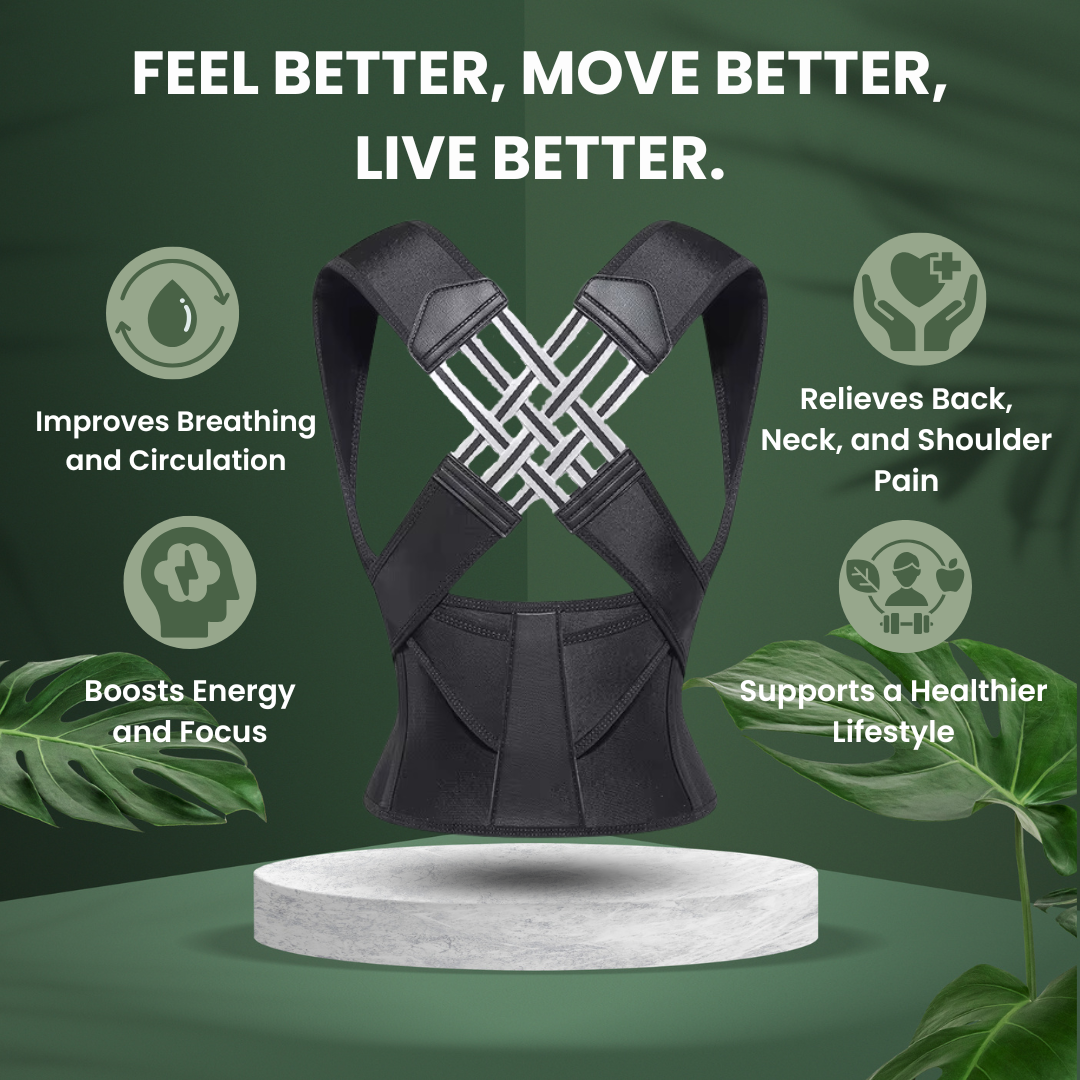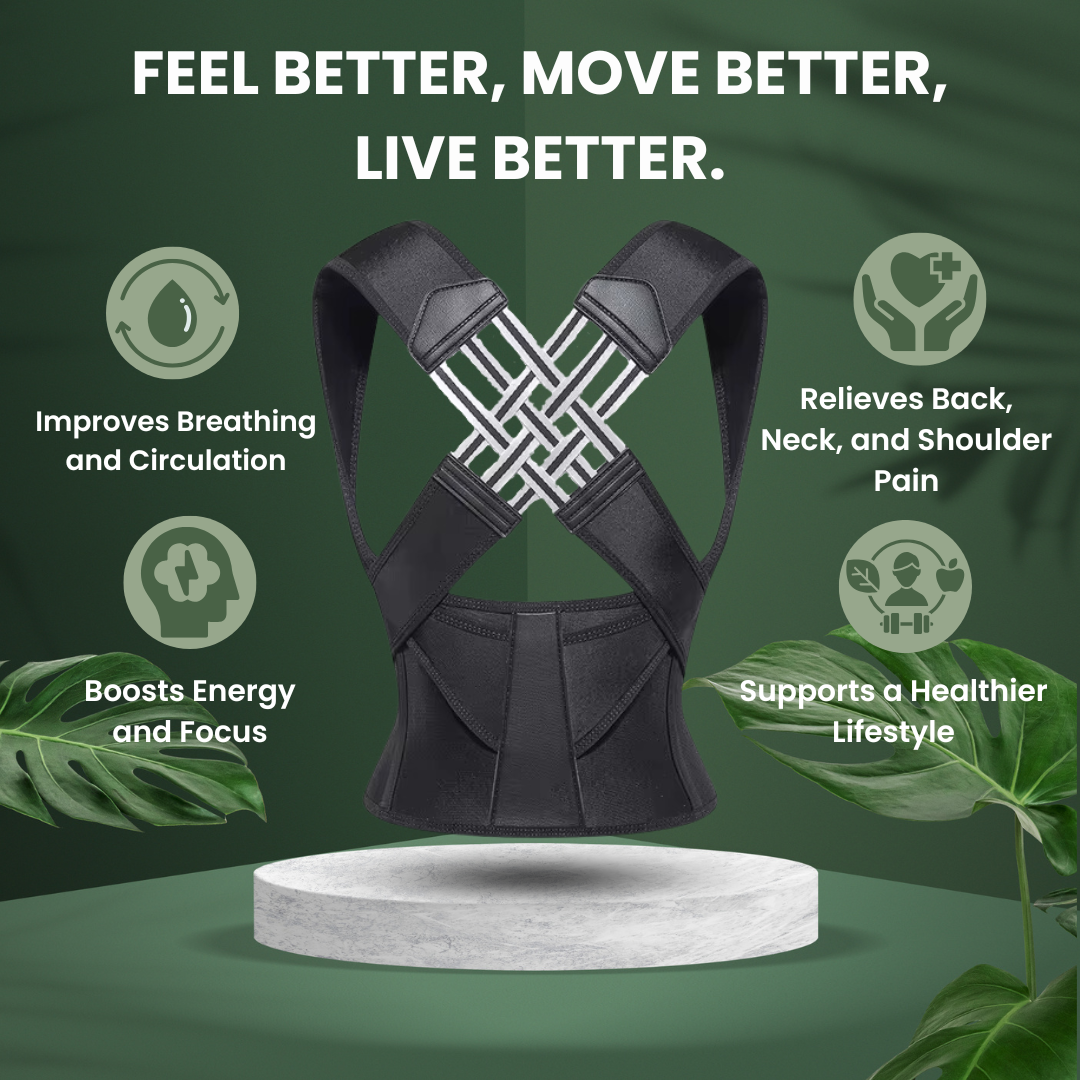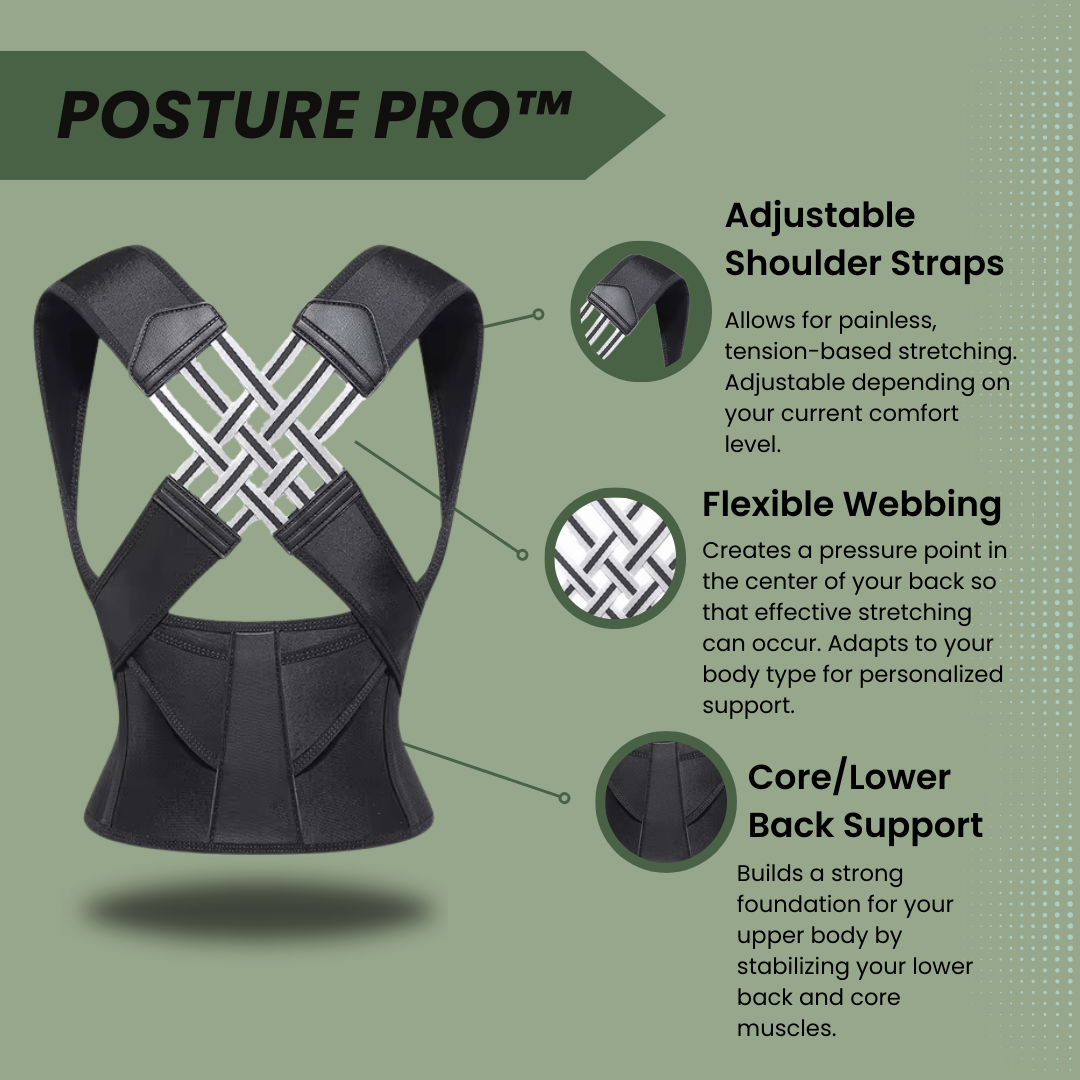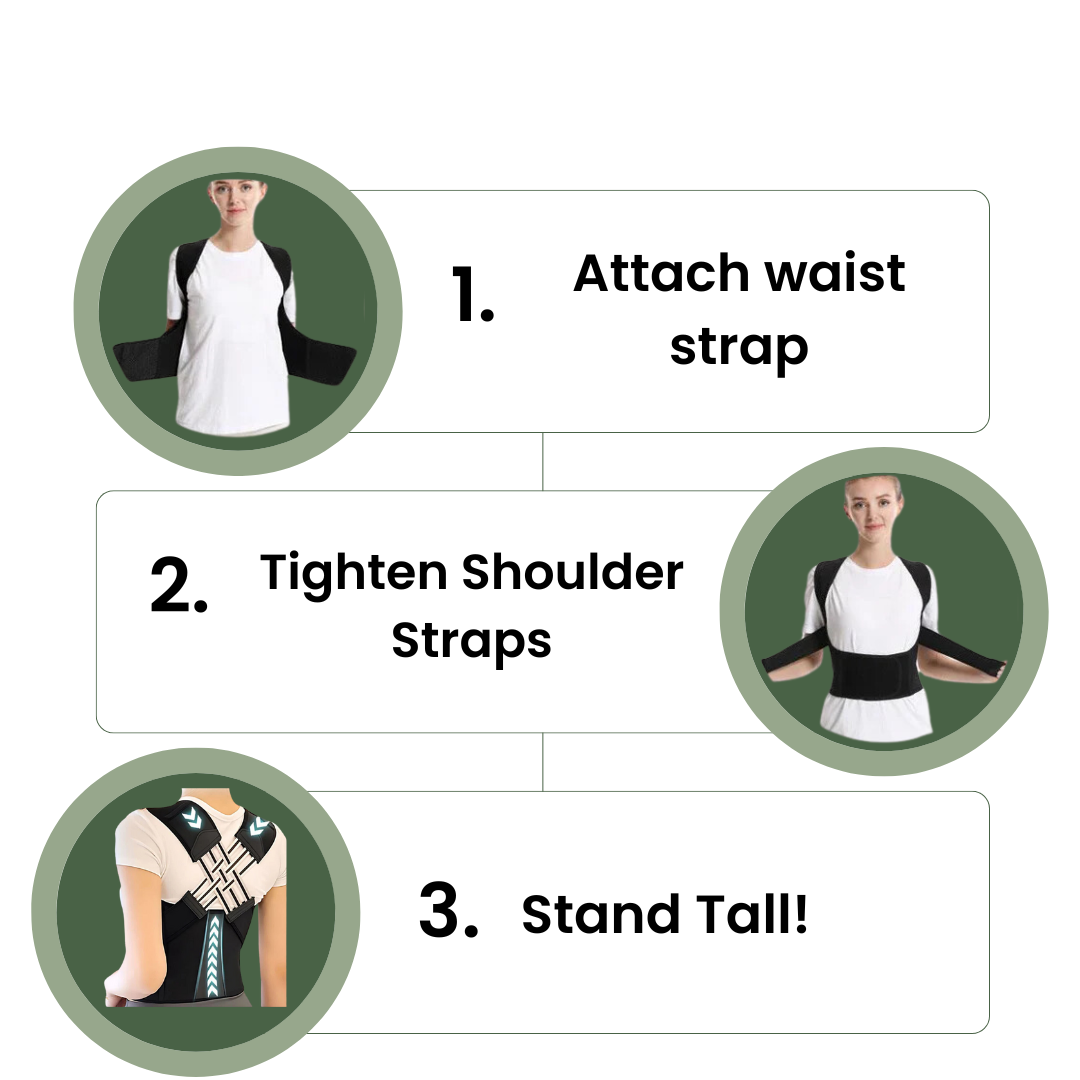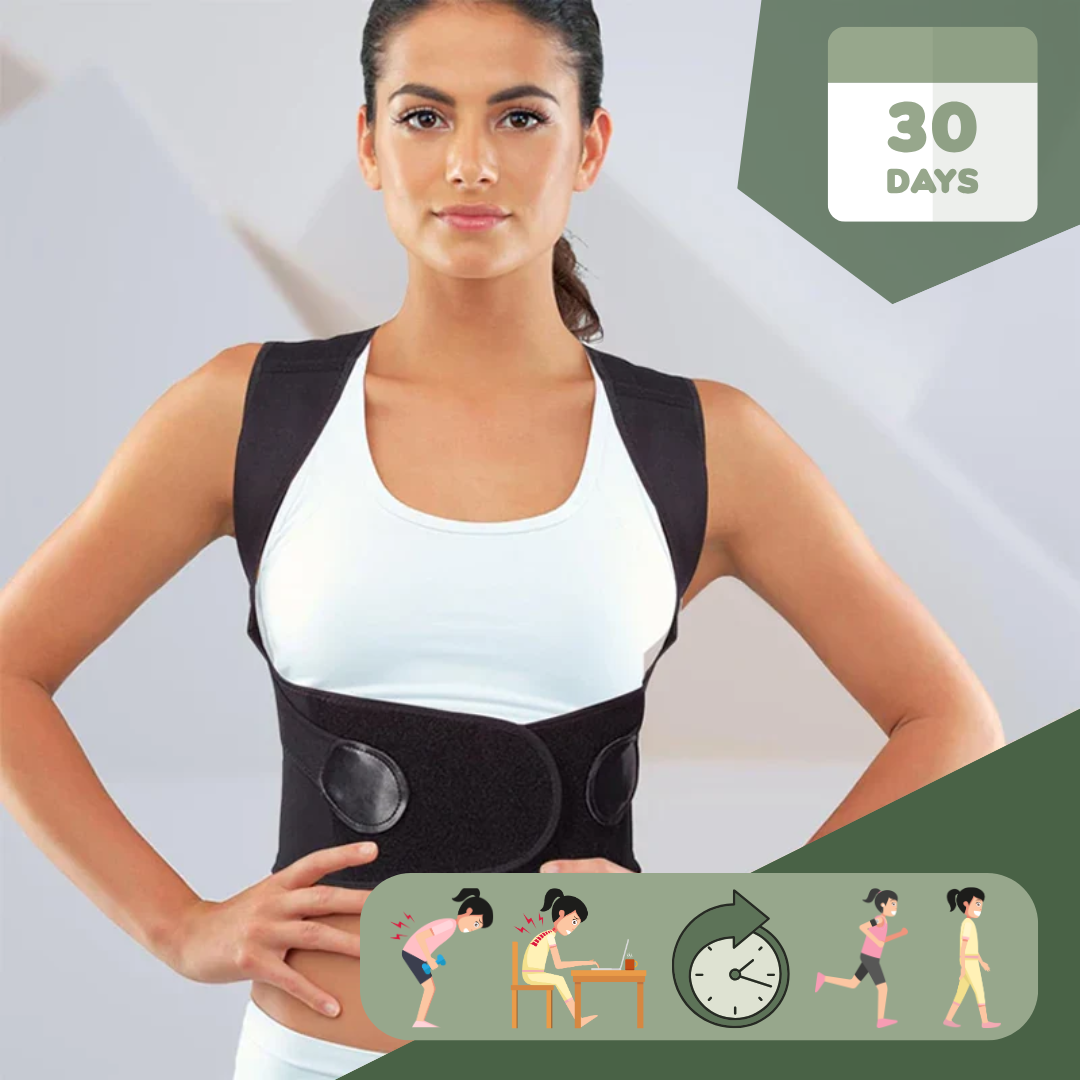Do you ever feel down or stressed for no clear reason? A key fact may surprise you: How you hold your body can affect your mood and thoughts. This article will show how improving posture, with tools like a posture corrector, can boost mental health.
Let's get started!
Key Takeaways
- Standing or sitting up straight can improve your mood and reduce feelings of sadness or fear.
- Good posture boosts self-esteem, especially during stressful times. It makes people feel better about themselves.
- Sitting upright helps with concentration and productivity by increasing blood flow to the brain.
- Daily exercises like Child's Pose and Chest Openers help maintain good posture. They stretch and strengthen important muscles.
- Making ergonomic adjustments at work or home supports proper spinal alignment, which is key for both physical and mental health.
The Connection Between Posture and Mental Health
How we hold ourselves can have a big impact on how we feel. Slouching or hunching over might make us feel more down, while sitting up straight tends to improve mood and energy levels.
Similarly, better posture often means less stress and anxiety, as our physical state can influence our mental state.
How posture affects mood and emotions
Standing straight does more than just make you look good. It deeply impacts how you feel inside. Research shows slouching leads to feeling sad and beaten down. On the flip side, a tall posture lifts your spirits and can even kick away those feelings of being scared or nervous.
Imagine a day where standing tall helps chase away the blues.
Proper posture enhances cognitive functions and emotional well-being.
Posture goes hand in hand with our mental state. Studies have found that simply sitting up can spark positive thoughts and energy levels, making worries lighter to carry around. For anyone battling stress or fighting off sadness, adjusting how you sit or stand could be a game-changer for your mood throughout the day.
Posture’s role in stress and anxiety management
Good posture does more than just make you look taller. It plays a big part in handling stress and anxiety. Studies show that sitting up straight helps keep your self-esteem up during tough times.
This was proven in a study where people who sat upright felt better about themselves, had less fear, and were in a better mood compared to those who slouched. They even faced stressful tasks with lower levels of fear.
Upright posture can also affect how your body responds to stress physically. Those who maintain an upright position have shown lower pulse pressure during and after being exposed to stress.
This means their heart didn't have to work as hard under pressure, which is good for overall health. So, practicing proper posture isn't just about preventing back pain or getting lumbar support; it's also about keeping calm and feeling strong mentally when things get tough.
Benefits of Practicing Good Posture

Practicing good posture brings many benefits. It can improve focus and productivity, while also enhancing self-confidence and self-image.
Improved focus and productivity
Maintaining a proper posture enhances your appearance and significantly contributes to improved cognitive function. Good posture greatly influences concentration and productivity levels.
Consider this: when the body is perfectly positioned, there is unobstructed blood flow, supplying the brain with ample oxygen. This circumstance allows for extended focus periods and improved memory retention.
Proper alignment not just augments our appearance but also uplifts our cognitive and emotional health.
Individuals who maintain an upright sitting position often exhibit heightened productivity. They prevent fatigue by deploying their muscles optimally, eliminating unnecessary tension in the back or neck.
By adhering to the correct posture, they sustain vitality throughout the day. This habit manifests in the swift completion of tasks and improved results. It becomes evident that even simple actions like rectifying a slouch can significantly influence work and study efficacy.
Enhanced self-confidence and self-image
Good posture enhances physical health and impacts mental well-being. It can help in reducing stress and promoting positive moods, thus boosting self-esteem and confidence. Furthermore, sitting upright can lead to an improved perception of job performance, positively affecting self-perception regarding work.
Beyond these psychological benefits, good posture can create the impression of increased height and a slimmer waistline. This enhancement in overall appearance can contribute to countering some aging effects, further boosting one’s self-confidence and self-image.
Tips for Maintaining Good Posture
To maintain good posture, consider including straightforward daily exercises into your routine. You can also make ergonomic adjustments at work and home to support proper spinal alignment and reduce back and neck discomfort. Good posture not only enhances physical health but can also positively impact your mental well-being.
Simple daily exercises
Maintaining good posture through simple daily exercises is essential for overall well-being. Here are important exercises to help improve posture:
- Child's Pose: This helps release tension in the lower back and neck while stretching the spine, glutes, and hamstrings.
- Chest Opener: This exercise enhances posture by opening up the chest and preventing the shoulders from rounding forward.
- High Plank: A core-strengthening exercise that also benefits spinal alignment and posture improvement.
- Downward-Facing Dog: This yoga pose elongates the spine, strengthens the back muscles, and reduces tension in the upper body.
- Planks, Crunches, Yoga, Pilates, and Barre Classes: These exercises help build crucial muscles for sustained posture improvement and overall spinal health.
Consistent practice of these exercises can show improvements within weeks.
Ergonomic adjustments for work and home
Proper ergonomic adjustments can significantly improve your comfort and health, whether you're working at an office or at home. Here are some straightforward yet impactful ergonomic adjustments to consider:
- Chair Height: Ensure that your chair allows your feet to rest flat on the floor with knees at a 90-degree angle and hips slightly higher than knees.
- Workspace Arrangement: Place frequently used items within arm's reach to avoid excessive reaching or twisting.
- Computer Monitor Position: Position your monitor about an arm's length away, with the top line of text at or slightly below eye level to reduce neck strain.
- Regular Movement: Include regular breaks for stretching and moving around to prevent stiffness and improve circulation.
- Desk Organization: Keep your work surface clutter-free, allowing for ample space for tasks and promoting a clear mind.
Keep in mind that these small adjustments can significantly impact your overall well-being.
Conclusion
Practicing good posture is crucial for both physical and mental well-being. The way we hold ourselves impacts our mood, focus, and self-confidence. By maintaining proper posture, you can enhance your mental health and reduce symptoms of anxiety and stress.
Keep in mind, taking care of your body through good posture can greatly contribute to a positive state of mind. So, endeavor to sit up straight and stand tall to support your mental health in the long run.
FAQs
1. How does posture impact mental health?
Posture, believe it or not, can significantly influence your mental health. Scientific studies have shown that maintaining a proper posture can enhance thought processes and improve behavioral health. Slouching correction through exercises and consciously maintaining an upright position could alleviate symptoms of some mental health disorders.
2. Can improving my posture help with back pain relief?
Absolutely! Improving your spinal alignment by correcting postures like the forward head position or rounded shoulders often results in lower back pain relief. Posture correctors with adjustable straps offer lumbar support and provide a comfortable fit to assist in this process.
3. What is the connection between neck pain and poor posture?
Poor posture, especially hunchback or slouching, puts strain on your neck leading to discomfort and long-term neck pain. Corrective measures such as wearing a back brace made of breathable material can provide immediate neck pain relief.
4. Is there any evidence that customers find these solutions effective?
Yes! Numerous customer reviews highlight how products for posture improvement have helped them manage their back and neck pains effectively.
5. Can I incorporate exercises into my routine for better posture?
Definitely! Exercising regularly helps strengthen your core muscles which are crucial for maintaining proper posture. Simple discipline in incorporating these routines along with using tools such as office chairs designed for lumbar support will do wonders for both your physical comfort and mental well-being!
6. Are there other benefits to having good postures apart from physical comfort?
Indeed there are! Maintaining good postures improves proprioceptive senses which play a key role in memory recall processes thereby positively influencing our memories over time.



